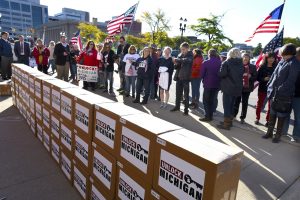Op-Ed by Anna Timmer
Just as 2020 is an unprecedented year in every way, Nov. 3 will be an unprecedented day in election history. While much has been said about what is at stake on the national level, in Michigan and other states around the country, local politics and down-ballot elections are buzzing in an extraordinary way. Beginning when Gov. Gretchen Whitmer issued her first of nearly 200 COVID-19-related executive orders in March, the old adage “elections have consequences” became astonishingly real, as never before, for a subset of apolitical citizens.
As mask mandates, school closures, stay-at-home orders, canceled weddings, massive forced unemployment and more slammed into everyone’s daily life, turning off the news and the seemingly weekly press conferences ceased to be an option. Regular citizens had to learn what the latest edicts were in order to carry out day-to-day functions like grocery shopping and going to work or whether they could even leave their homes. Parents everywhere became keenly aware of the political leanings of their children's school districts as they waited for news about whether students would be allowed to sit in classrooms.
 Amid the upheaval, several Michigan-based anti-lockdown Facebook groups sprang up, including one approaching a half million members before it was shut down by Facebook. Since spring, thousands of Michiganders have shared questions and information with each other in these groups about constitutional law, closings, mask mandates, which county sheriffs are enforcing the orders and, most notably, who is on the ballot in November. This phenomenon began to emerge in early summer, as it became clear that the Michigan Supreme Court would be vital to the re-open movement. As a result of several lawsuits, Michigan’s highest court was set to address Gov. Whitmer’s unilateral abuse of power that relied on the vague language of a 1945 Michigan law as justification for ignoring the Republican-led legislature that sought to rein in her authority. Suddenly vigorous, community-level debates were taking place all over Facebook months before the election. Which judges were on the upcoming ballot? What did their judicial records look like, which donors backed them?
Amid the upheaval, several Michigan-based anti-lockdown Facebook groups sprang up, including one approaching a half million members before it was shut down by Facebook. Since spring, thousands of Michiganders have shared questions and information with each other in these groups about constitutional law, closings, mask mandates, which county sheriffs are enforcing the orders and, most notably, who is on the ballot in November. This phenomenon began to emerge in early summer, as it became clear that the Michigan Supreme Court would be vital to the re-open movement. As a result of several lawsuits, Michigan’s highest court was set to address Gov. Whitmer’s unilateral abuse of power that relied on the vague language of a 1945 Michigan law as justification for ignoring the Republican-led legislature that sought to rein in her authority. Suddenly vigorous, community-level debates were taking place all over Facebook months before the election. Which judges were on the upcoming ballot? What did their judicial records look like, which donors backed them?
As the school year loomed and districts announced the continuation of virtual learning, outraged parents discussed and debated school board candidates and university trustees at seemingly record-breaking interest levels. As this took place, I began to see my Democrat-leaning friends express their frustration with Whitmer, and I was contacted by a handful of quiet, apolitical friends asking me who to vote for in the smaller races. It certainly appeared that for a select set of Michigan voters, down-ballot races could be an even heavier driver to the polls than the presidential race. I was unable to find polling data on anything other than the major races, but I discovered that Google search trends painted a fascinating picture.
Since 2004 when Google searches began to be tracked, they have accurately predicted the outcome of every presidential election based solely on the number of searches for each candidate. Could something so simple work for down-ballot races as well? Using the Google trends tool, searches in Michigan for “school board election” and “university trustee election” are consistently up over 300 percent from both the 2018 and 2016 elections during the same time frame. Searches for “Michigan Supreme Court election” have shown massive spikes as well. Further up the ballot, searches for Republican candidate for U.S. Senate John James, often polling just below or within the margin of error against Democrat Gary Peters, have consistently been double or triple that of his opponent.  The hotly contested D3 House seat famously vacated by Congressman Justin Amash features two political outsiders—Republican Peter Meijer and Democrat Hillary Scholten—in what polls paint as a tight race, yet Meijer has consistently outperformed Scholten in Google searches since the primary in August.
The hotly contested D3 House seat famously vacated by Congressman Justin Amash features two political outsiders—Republican Peter Meijer and Democrat Hillary Scholten—in what polls paint as a tight race, yet Meijer has consistently outperformed Scholten in Google searches since the primary in August.
With Michigan as Trump’s tightest popular vote margin from 2016 and an unprecedented year of state and local political oppression, pollsters only focusing on the top of the ticket may wake up on Nov. 4 and realize they had a massive, mitten-shaped blind spot.



